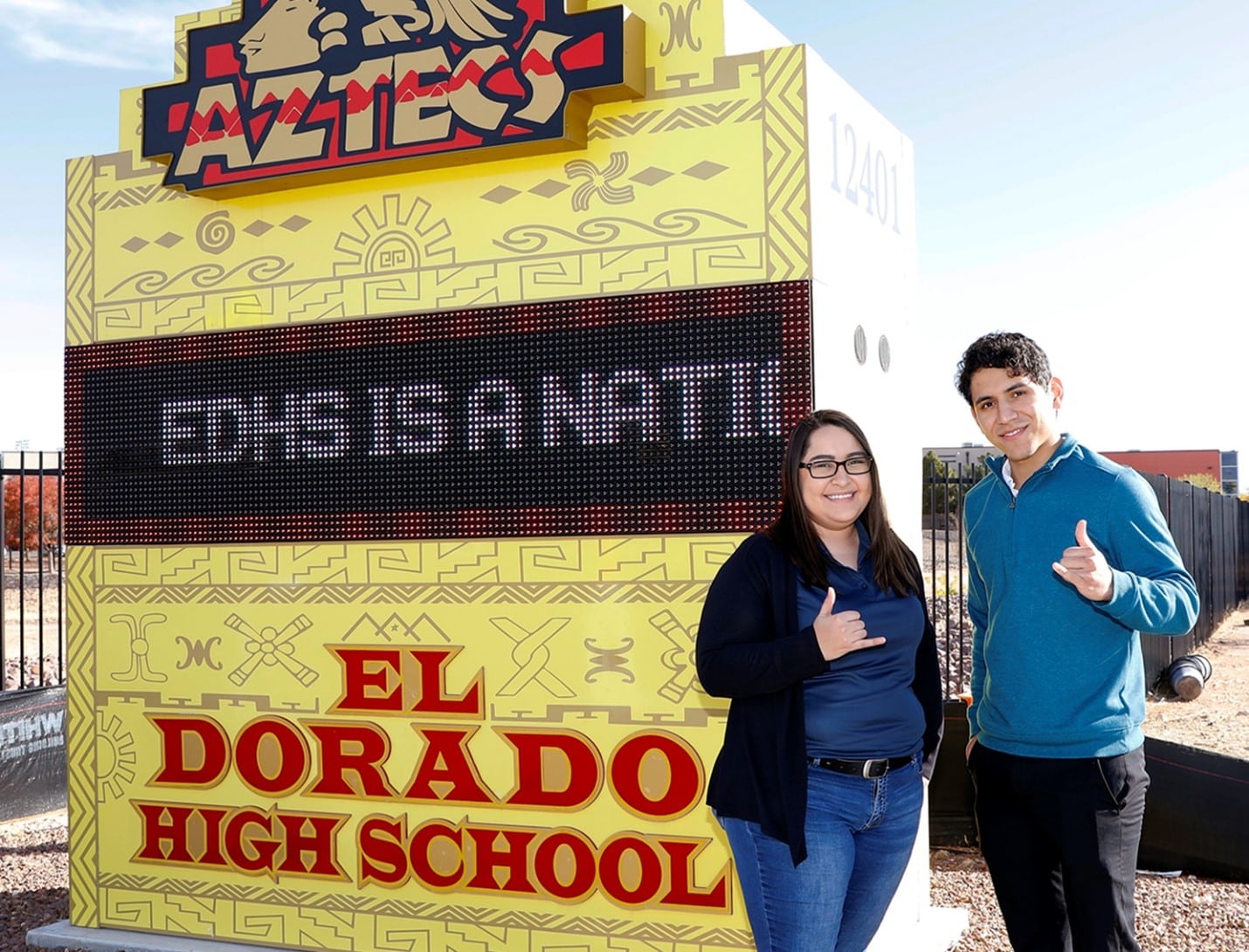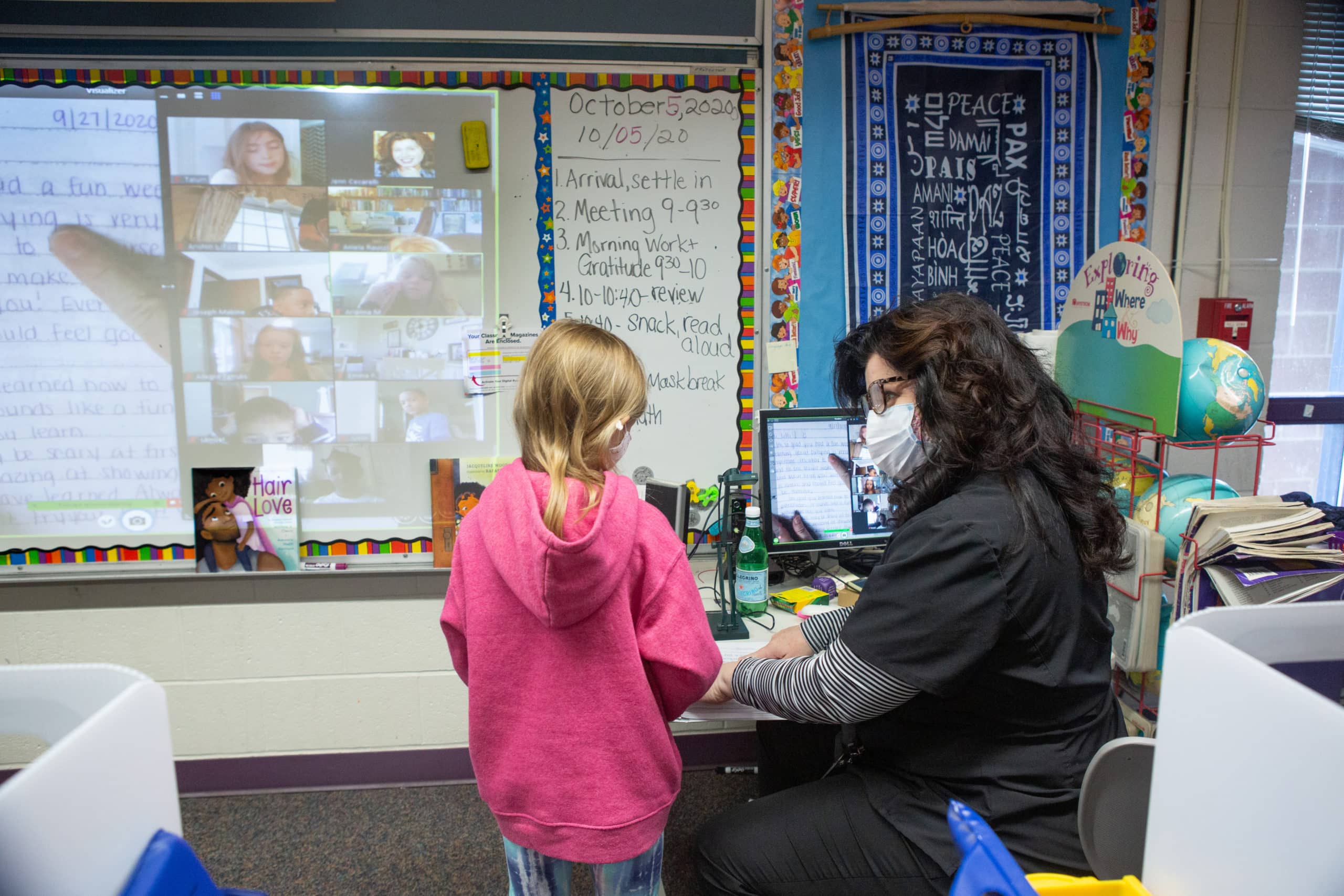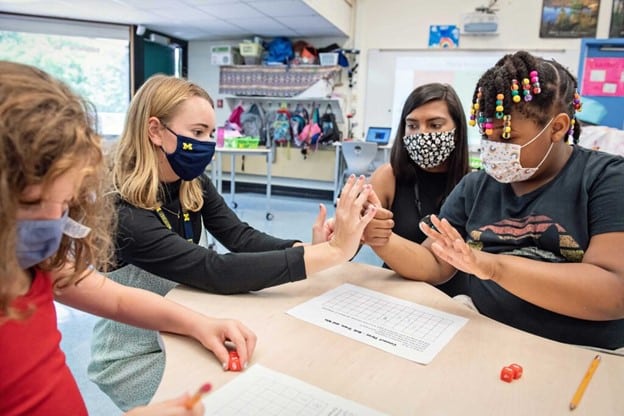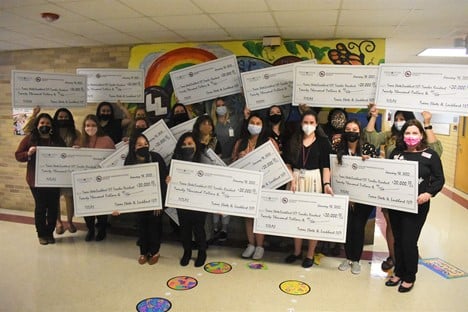15 Mar2022
By Kaitlyn Brennan
 This weekly Washington Update is intended to keep members informed on Capitol Hill activities impacting the educator preparation community. The views expressed in this post do not necessarily reflect the views of AACTE.
This weekly Washington Update is intended to keep members informed on Capitol Hill activities impacting the educator preparation community. The views expressed in this post do not necessarily reflect the views of AACTE.
On the eve of the one-year anniversary of the passage of the American Rescue Plan Act, Congress passed a Fiscal Year (FY) 2022 Omnibus Spending Bill. The FY22 bill includes increases for education, but not nearly at the level that was originally requested by the Biden Administration. Considerable work lies ahead to secure a robust federal investment to support rebuilding and diversifying the special educator and specialized instructional personnel pipeline.
15 Mar2022
By Daniel Perez
This article originally appeared on the UTEP website.

Photo: Laura Trejo / UTEP Marketing and Communications
Ten graduate students in The University of Texas at El Paso’s teacher preparation program earned $10,000 scholarships to help finance their education and teacher certification, thanks to a $108,000 grant from the Charles Butt Foundation.
UTEP nominated students for the Charles Butt Scholarship for Aspiring Teachers who were accepted into the accelerated M.A. in Education with teacher certification program, which includes a year-long residency in partnership with El Paso County school districts. Those nominees went through two rigorous application processes — one at UTEP and the other through the Charles Butt Foundation (CBF), formerly the Raise Your Hand Texas Education Foundation.
Erika Mein, Ph.D., associate dean for undergraduate studies and educator preparation in the College of Education, is a principal investigator of CBF’s Raising Texas Teachers partner program at UTEP. She said she was elated that the CBF selected 10 UTEP students to be part of the program’s initial cohort. She described the students as committed, professional and enthusiastic.
11 Mar2022
By Michael Rose
 Congressional leaders announced this week that they have come to an agreement on the annual spending bills that will fund the government for the remainder of the fiscal year. The government has been operating under a continuing resolution since October (a continuing resolution funds the government at the previous year’s levels). This agreement will allow Congress to begin work on the fiscal year 2023 spending bills, which should be signed into law by September 30.
Congressional leaders announced this week that they have come to an agreement on the annual spending bills that will fund the government for the remainder of the fiscal year. The government has been operating under a continuing resolution since October (a continuing resolution funds the government at the previous year’s levels). This agreement will allow Congress to begin work on the fiscal year 2023 spending bills, which should be signed into law by September 30.
The House and Senate are expected to pass the legislation in the coming days and President Biden is expected to sign it into law.
08 Mar2022
By Kaitlyn Brennan

Photo by Allison Shelley for EDUimages
This weekly Washington Update is intended to keep members informed on Capitol Hill activities impacting the educator preparation community. The views expressed in this post do not necessarily reflect the views of AACTE.
So much around the world has changed since our last Washington Update. While Congress was on recess all eyes were on the Russian invasion of the Ukraine. We suspect Congress will respond to the President’s request and put forth a supplemental funding package that includes critical assistance for the Ukraine and additional support for addressing future variants of COVID-9. We also anticipate an FY 2022 omnibus appropriations package that has a significant increase for both defense and non-defense programs, including education, will pass sometime next week.
22 Feb2022
By Kaitlyn Brennan
 As we head into Congressional recess, behind the scenes things are heating up surrounding the passage of an FY22 appropriations bill which includes historic increases for education funding. The Senate passed a stop-gap funding measure on Thursday that, once signed by the President will give Members and their staff another three weeks to cement a deal on FY22. The proposed increases to education funding are critical in supporting rebuilding and diversifying the educator pipeline-now is the time to make sure your voices are heard.
As we head into Congressional recess, behind the scenes things are heating up surrounding the passage of an FY22 appropriations bill which includes historic increases for education funding. The Senate passed a stop-gap funding measure on Thursday that, once signed by the President will give Members and their staff another three weeks to cement a deal on FY22. The proposed increases to education funding are critical in supporting rebuilding and diversifying the educator pipeline-now is the time to make sure your voices are heard.
14 Feb2022
Urge Your Members of Congress to Maintain the Historic Education Funding Levels
By Kaitlyn Brennan
 Congress is one step closer to passing an FY22 appropriations bill which includes historic increases for education funding. Now is the time to urge your Members of Congress to maintain the proposed levels in the House passed education funding bill in the final appropriations package. Voices from the field are imperative to garnering the momentum to get this historic legislation across the finish line.
Congress is one step closer to passing an FY22 appropriations bill which includes historic increases for education funding. Now is the time to urge your Members of Congress to maintain the proposed levels in the House passed education funding bill in the final appropriations package. Voices from the field are imperative to garnering the momentum to get this historic legislation across the finish line.
The House Passes a Short-Term Spending Patch and Congressional Leadership Reaches Agreement on Funding Levels
This week Congress made significant strides towards passing an FY22 appropriations bill that will fund the government through the fall. On Tuesday evening the House voted 272-162 to pass a stopgap funding stopgap funding bill that will keep the government running when the Continuing Resolution (CR) expires on February 18. The Senate is expected to take up the measure that will keep the government funded through March 11 in the coming week.
11 Feb2022
By Fernanda Pires and Danielle Dimcheff

Students in the Master of Arts with Elementary Teacher Certification program work with elementary school students at Ann Arbor Open School in July 2021. Image credit: Leisa Thompson
With a $14.7 million gift, University of Michigan alumna Eileen Lappin Weiser will establish a new center at the U-M School of Education to make learning accessible to all youth.
Her gift, representing the largest commitment in the School of Education’s 100-year history, will help reshape teaching and learning to meet the needs of all different kinds of learners and prepare them for the jobs of the future.
The Eileen Lappin Weiser Learning Sciences Center will strengthen the connections between research and practice by engaging numerous partners to study the many places and ways that learning happens. This will involve the design and testing of curricula for diverse learners, collaboration with teachers and administrators to promote evidence-based practices, and efforts to scale successful education solutions to be available to all learners.
07 Feb2022
By Kaitlyn Brennan
 This weekly Washington Update is intended to keep members informed on Capitol Hill activities impacting the educator preparation community. The views expressed in this post do not necessarily reflect the views of AACTE.
This weekly Washington Update is intended to keep members informed on Capitol Hill activities impacting the educator preparation community. The views expressed in this post do not necessarily reflect the views of AACTE.
While it feels like there has been sand in the gears surrounding movement on FY22 appropriations and the Build Back Better Act- Congress may be on a path to more forward movement in the coming weeks. We expect there could be movement in the House next week to address the Continuing Resolution (CR) which expires on February 18th. Now is the time for advocates to be at the table expressing the critical need for the proposed historic investments in education funding.
01 Feb2022
By Anna Merod
This article originally appeard in K12 Dive and is reprinted with permission.
Dive Brief:
- Supporting teacher prep programs through regulatory relief is key to addressing the ongoing teacher shortage that is impacting districts nationwide, said Linda Darling-Hammond, president and CEO of the Learning Policy Institute, during EdPrepLab’s Second Annual Virtual Policy Summit
- One potential pending policy solution is the EDUCATORS for America Act, introduced by Sen. Jack Reed, D-R.I., and Rep. Alma Adams, D-N.C., in December to invest $1 billion annually for states to enhance teacher preparation programs and provide grants for strategies to meet K-12 workforce needs, said Lynn Gangone, president and CEO of the American Association of Colleges for Teacher Education.
- Funds from the $122.7 billion awarded to school districts nationwide through the pandemic-relief American Rescue Plan can also be used to fuel innovative, collaborative solutions between higher education and K-12 leaders to fix teacher shortages, according to Roberto Rodriguez, assistant secretary at the U.S. Department of Education’s Office of Planning, Evaluation and Policy Development.
28 Jan2022
By Michael Rose
 AACTE has heard about several educator preparation programs and local school districts partnering together to utilize Elementary and Secondary School Emergency Relief (ESSER) Funds to help address the teacher shortage in their communities. Now, we want to hear from you. Please take a moment to complete this short survey to share how you are using ESSER funds to place teacher candidates in local classrooms to help with the transition back to in-person learning.
AACTE has heard about several educator preparation programs and local school districts partnering together to utilize Elementary and Secondary School Emergency Relief (ESSER) Funds to help address the teacher shortage in their communities. Now, we want to hear from you. Please take a moment to complete this short survey to share how you are using ESSER funds to place teacher candidates in local classrooms to help with the transition back to in-person learning.
25 Jan2022
By Brian Blackley
In 2021, AACTE supported a federal application by the State of Tennessee and member institution Austin Peay State University (APSU) to create educator preparation-based Grow Your Own programs as acceptable apprenticeships for aspiring educators. After rigorous review and meetings with state and federal officials, AACTE endorsed the effort, which partners college or university educator preparation programs (EPPs) with local school districts to ensure teacher candidates are profession-ready upon entering the classroom.
Paving the way for teaching and educator workforce development nationwide, the Tennessee Department of Education announced it has pioneered a new way to develop teacher pipelines, and is the first state to be approved by the U.S. Department of Labor to establish a permanent Grow Your Own model, with Clarksville-Montgomery County School System and Austin Peay State University’s Teacher Residency program becoming the first registered apprenticeship program for teaching in the country. Tennessee is the first state in the country to sponsor Teacher Occupation Apprenticeship programs between school districts and Educator Preparation Programs (EPPs), which will further the state’s and nation’s efforts to extend the teacher pipeline and address teacher shortages.
24 Jan2022
By Kaitlyn Brennan
 It was another busy week in Washington as lawmakers prepared for the congressional recess the following week. Conversations are heating up behind the scenes surrounding FY22 appropriations and a new iteration of the Build Back Better Act. Advocacy work will be critical in the coming weeks to ensure the historic proposals for education funding are included in both pieces of legislation.
It was another busy week in Washington as lawmakers prepared for the congressional recess the following week. Conversations are heating up behind the scenes surrounding FY22 appropriations and a new iteration of the Build Back Better Act. Advocacy work will be critical in the coming weeks to ensure the historic proposals for education funding are included in both pieces of legislation.
20 Jan2022
By Sandy Pantlik

Texas State University students participating in the Texas Education Agency’s (TEA) approved teacher residency program at Lockhart Independent School District (LSD) were surprised with $20,000 annual stipends awarded during a special event on Jan. 18 at Clear Fork Elementary.
The stipends, in the form of oversized checks, were presented to a cohort of 17 Texas State students who are embedded in Lockhart ISD for a full year, working with mentor teachers and engaging with students. The funds are meant to support the students financially while they are working in the residency program.
18 Jan2022
By Jean Cook and Shanderia Minor
The MDE is using American Rescue Plan Elementary and Secondary School Emergency Relief (ESSER) funds to cover the grants.
The MTR will provide grants to the universities’ educator preparation programs to enroll diverse participants to work toward their graduate degree and Mississippi teacher certification. MTR will include training alongside a mentor teacher, testing support, professional development, ongoing assessment and a commitment to teach in a geographical critical shortage school or district serving low-income children, racial/ethnic minorities and children with disabilities disproportionately impacted by COVID-19.
18 Jan2022
By Kaitlyn Brennan
 This weekly Washington Update is intended to keep members informed on Capitol Hill activities impacting the educator preparation community. The views expressed in this post do not necessarily reflect the views of AACTE.
This weekly Washington Update is intended to keep members informed on Capitol Hill activities impacting the educator preparation community. The views expressed in this post do not necessarily reflect the views of AACTE.
The Senate adjourned for the long weekend on Thursday and postponed next week’s scheduled recess to the week of January 24th. The chamber will return on Tuesday to continue debate on voting and election legislation. Behind the scenes, conversations surrounding FY22 appropriations are garnering more traction than they have in recent months. We expect the next month to be especially busy as we inch closer to the February 18th deadline for either passing FY22 appropriations or extending the Continuing Resolution (CR) to avoid a government shutdown.
 This weekly Washington Update is intended to keep members informed on Capitol Hill activities impacting the educator preparation community. The views expressed in this post do not necessarily reflect the views of AACTE.
This weekly Washington Update is intended to keep members informed on Capitol Hill activities impacting the educator preparation community. The views expressed in this post do not necessarily reflect the views of AACTE. 







 Congressional leaders announced this week that they have come to an agreement on the annual spending bills that will fund the government for the remainder of the fiscal year. The government has been operating under a continuing resolution since October (a continuing resolution funds the government at the previous year’s levels). This agreement will allow Congress to begin work on the fiscal year 2023 spending bills, which should be signed into law by September 30.
Congressional leaders announced this week that they have come to an agreement on the annual spending bills that will fund the government for the remainder of the fiscal year. The government has been operating under a continuing resolution since October (a continuing resolution funds the government at the previous year’s levels). This agreement will allow Congress to begin work on the fiscal year 2023 spending bills, which should be signed into law by September 30. 
 As we head into Congressional recess, behind the scenes things are heating up surrounding the passage of an FY22 appropriations bill which includes historic increases for education funding. The Senate passed a stop-gap funding measure on Thursday that, once signed by the President will give Members and their staff another three weeks to cement a deal on FY22. The proposed increases to education funding are critical in supporting rebuilding and diversifying the educator pipeline-now is the time to make sure your voices are heard.
As we head into Congressional recess, behind the scenes things are heating up surrounding the passage of an FY22 appropriations bill which includes historic increases for education funding. The Senate passed a stop-gap funding measure on Thursday that, once signed by the President will give Members and their staff another three weeks to cement a deal on FY22. The proposed increases to education funding are critical in supporting rebuilding and diversifying the educator pipeline-now is the time to make sure your voices are heard.  Congress is one step closer to passing an FY22 appropriations bill which includes historic increases for education funding. Now is the time to urge your Members of Congress to maintain the proposed levels in the House passed education funding bill in the final appropriations package. Voices from the field are imperative to garnering the momentum to get this historic legislation across the finish line.
Congress is one step closer to passing an FY22 appropriations bill which includes historic increases for education funding. Now is the time to urge your Members of Congress to maintain the proposed levels in the House passed education funding bill in the final appropriations package. Voices from the field are imperative to garnering the momentum to get this historic legislation across the finish line.
 This weekly Washington Update is intended to keep members informed on Capitol Hill activities impacting the educator preparation community. The views expressed in this post do not necessarily reflect the views of AACTE.
This weekly Washington Update is intended to keep members informed on Capitol Hill activities impacting the educator preparation community. The views expressed in this post do not necessarily reflect the views of AACTE.  AACTE has heard about several educator preparation programs and local school districts partnering together to utilize Elementary and Secondary School Emergency Relief (ESSER) Funds to help address the teacher shortage in their communities. Now, we want to hear from you. Please take a moment to complete this
AACTE has heard about several educator preparation programs and local school districts partnering together to utilize Elementary and Secondary School Emergency Relief (ESSER) Funds to help address the teacher shortage in their communities. Now, we want to hear from you. Please take a moment to complete this  It was another busy week in Washington as lawmakers prepared for the congressional recess the following week. Conversations are heating up behind the scenes surrounding FY22 appropriations and a new iteration of the Build Back Better Act. Advocacy work will be critical in the coming weeks to ensure the historic proposals for education funding are included in both pieces of legislation.
It was another busy week in Washington as lawmakers prepared for the congressional recess the following week. Conversations are heating up behind the scenes surrounding FY22 appropriations and a new iteration of the Build Back Better Act. Advocacy work will be critical in the coming weeks to ensure the historic proposals for education funding are included in both pieces of legislation.
 This weekly Washington Update is intended to keep members informed on Capitol Hill activities impacting the educator preparation community. The views expressed in this post do not necessarily reflect the views of AACTE.
This weekly Washington Update is intended to keep members informed on Capitol Hill activities impacting the educator preparation community. The views expressed in this post do not necessarily reflect the views of AACTE.